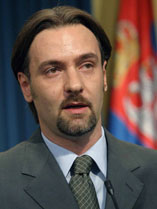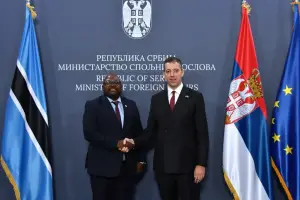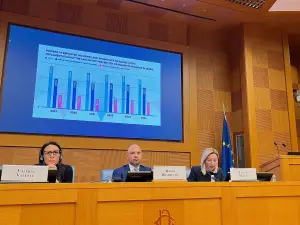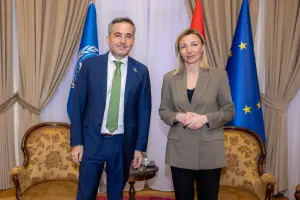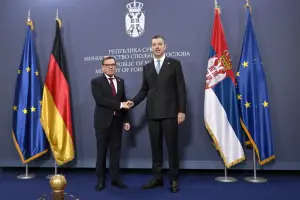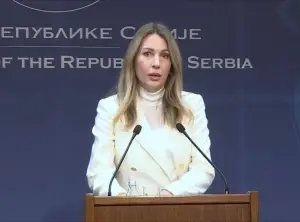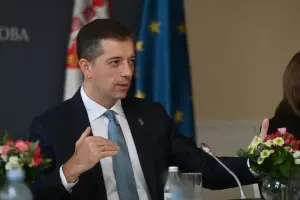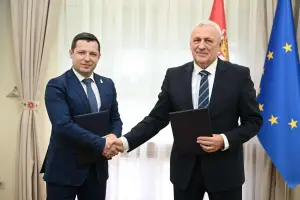Q:
A:
Government looks for the best solution for Serbs in Kosovo-Metohija
Belgrade,
8 October 2004
Head of the Serbian government's Office of Media Relations Srdjan Djuric said today that the government is firmly pro-European oriented, and that in the case of Kosovo-Metohija, it only asks that Serbs and other non-Albanians have the same rights as all other peoples in Europe.
At a regular meeting with journalists, Djuric said that the government has been actively engaged in the politics regarding Kosovo-Metohija from the very beginning, both at the internal and external levels. He voiced hope that all institutions and political parties will struggle to prevent Kosovo-Metohija from becoming independent, since the national consensus has been reached on that issue.
He recalled that after the March 17 violence in the province, the international community praised the Serbian government for managing to reduce tensions in the province and assist in the sanation of the grave consequences of the pogrom.
Since the formation of the government, Prime Minister Vojislav Kostunica has had many international contacts with foreign ministers, top state officials and heads of large international organisations to discuss the situation in Kosovo-Metohija. Also, regular contacts and meetings with representatives of certain governments and international institutions are very important, said Djuric.
Djuric recalled that after March 17, the Serbian government launched talks on the state strategy for Kosovo-Metohija, which is the first time that Serbia has approached that problem seriously. At the initiative of the Prime Minister, experts from all political parties who worked on the initial draft of the plan for a political solution to the problem in Kosovo-Metohija joined together and made the new plan. After that, Kostunica held consultations with leaders of all parliamentary parties. Immediately after that, the plan was forwarded to the Serbian parliament, which adopted it unanimously on April 29.
Djuric stressed that even after the March 17 pogrom nothing has changed in the province. Serbs were not given guarantees; they are still harassed and endangered. Everything that the government does and has done in the previous period has the aim of securing the basic right to life for Serbs and other non-Albanians in the province. If that right does not exist, all other rights are irrelevant.
Apart from the fact that the government did not call Serbs to go to Kosovo polls scheduled for October 23, foreign leaders yesterday called on the government to continue talks on institutional guarantees, Djuric said. He added that the head of the UN office in Belgrade, Julian Harston, said yesterday that Serbs will not lose the right to influence the province's status if they refuse to go to the polls.
Djuric pointed out that the international community on various occasions described the Serbian government's Plan for Kosovo-Metohija as a constructive contribution to the resolution of crisis in the province. This document is a state strategy for the resolution of that problem. Over the past few months, the Serbian government, together with the members of the Prime Minister's Cabinet, worked hard so that parts of the plan could be accepted and applied and the position of Serbs in the province improved.
The Head of the Office of Media Relations said that the Serbian government has done a lot in the field of lobbying in international circles, but it did not take part in the formation of the caucus group in the US Congress. This group was formed by the Cabinet of the Serbian President. According to Djuric, the Serbian government welcomes every initiative aimed at improving the position of Serbs in the Serbian southern province. It believes that in the future such initiatives will be launched by all state bodies with the aim of improving the position of Serbs in the international public and securing the recognition of all rights of Serbs who live in the province.
The Serbian government has been open to any dialogue from the very beginning and its priority is to find the best solution for the Serbs in the province. Its position is that the international community first has to guarantee the basic human rights to Serbs and then to ask them to take part in the elections. That is the only way to convince Serbs that they can stay and have a normal life in Kosovo-Metohija, said Djuric. In view of the fact that the situation has not changed since March 17, the government does not have the right to call on Serbs to take part in the upcoming elections.
Djuric reiterated that the government decided in its session yesterday to continue with the implementation of the Plan for a political solution to the situation in Kosovo, and stressed that the decision was adopted unanimously. The only thing that the government can do is to intensify its contacts both within and outside Serbia, in a move to secure the minimum of guarantees for normal life of Serbs in Kosovo-Metohija.
The Head of the Office for Media Relations said that the Serbian government cooperates with the Hague tribunal and described the latest meeting of Prime Minister Kostunica with tribunal's Chief Prosecutor Carla del Ponte as very useful. Kostunica explained the specific interests of Serbia in that cooperation. They entail meeting international obligations and keeping political stability of the country. It is yet to be seen whether that pattern of cooperation will be functional, said Djuric and added that the government concluded after that meeting that the cooperation in the upcoming period will be much more successful than before.
Speaking about the new constitution, Djuric recalled that the Serbian government put forward a proposal of the new constitution several months ago. There should be no disputes about that issue, because it is in everyone's interest that the constitution be adopted as soon as possible.
He recalled that after the March 17 violence in the province, the international community praised the Serbian government for managing to reduce tensions in the province and assist in the sanation of the grave consequences of the pogrom.
Since the formation of the government, Prime Minister Vojislav Kostunica has had many international contacts with foreign ministers, top state officials and heads of large international organisations to discuss the situation in Kosovo-Metohija. Also, regular contacts and meetings with representatives of certain governments and international institutions are very important, said Djuric.
Djuric recalled that after March 17, the Serbian government launched talks on the state strategy for Kosovo-Metohija, which is the first time that Serbia has approached that problem seriously. At the initiative of the Prime Minister, experts from all political parties who worked on the initial draft of the plan for a political solution to the problem in Kosovo-Metohija joined together and made the new plan. After that, Kostunica held consultations with leaders of all parliamentary parties. Immediately after that, the plan was forwarded to the Serbian parliament, which adopted it unanimously on April 29.
Djuric stressed that even after the March 17 pogrom nothing has changed in the province. Serbs were not given guarantees; they are still harassed and endangered. Everything that the government does and has done in the previous period has the aim of securing the basic right to life for Serbs and other non-Albanians in the province. If that right does not exist, all other rights are irrelevant.
Apart from the fact that the government did not call Serbs to go to Kosovo polls scheduled for October 23, foreign leaders yesterday called on the government to continue talks on institutional guarantees, Djuric said. He added that the head of the UN office in Belgrade, Julian Harston, said yesterday that Serbs will not lose the right to influence the province's status if they refuse to go to the polls.
Djuric pointed out that the international community on various occasions described the Serbian government's Plan for Kosovo-Metohija as a constructive contribution to the resolution of crisis in the province. This document is a state strategy for the resolution of that problem. Over the past few months, the Serbian government, together with the members of the Prime Minister's Cabinet, worked hard so that parts of the plan could be accepted and applied and the position of Serbs in the province improved.
The Head of the Office of Media Relations said that the Serbian government has done a lot in the field of lobbying in international circles, but it did not take part in the formation of the caucus group in the US Congress. This group was formed by the Cabinet of the Serbian President. According to Djuric, the Serbian government welcomes every initiative aimed at improving the position of Serbs in the Serbian southern province. It believes that in the future such initiatives will be launched by all state bodies with the aim of improving the position of Serbs in the international public and securing the recognition of all rights of Serbs who live in the province.
The Serbian government has been open to any dialogue from the very beginning and its priority is to find the best solution for the Serbs in the province. Its position is that the international community first has to guarantee the basic human rights to Serbs and then to ask them to take part in the elections. That is the only way to convince Serbs that they can stay and have a normal life in Kosovo-Metohija, said Djuric. In view of the fact that the situation has not changed since March 17, the government does not have the right to call on Serbs to take part in the upcoming elections.
Djuric reiterated that the government decided in its session yesterday to continue with the implementation of the Plan for a political solution to the situation in Kosovo, and stressed that the decision was adopted unanimously. The only thing that the government can do is to intensify its contacts both within and outside Serbia, in a move to secure the minimum of guarantees for normal life of Serbs in Kosovo-Metohija.
The Head of the Office for Media Relations said that the Serbian government cooperates with the Hague tribunal and described the latest meeting of Prime Minister Kostunica with tribunal's Chief Prosecutor Carla del Ponte as very useful. Kostunica explained the specific interests of Serbia in that cooperation. They entail meeting international obligations and keeping political stability of the country. It is yet to be seen whether that pattern of cooperation will be functional, said Djuric and added that the government concluded after that meeting that the cooperation in the upcoming period will be much more successful than before.
Speaking about the new constitution, Djuric recalled that the Serbian government put forward a proposal of the new constitution several months ago. There should be no disputes about that issue, because it is in everyone's interest that the constitution be adopted as soon as possible.

